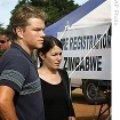The Doctors Without Borders charity denounced the sudden closure of the South African government's refugee registration center in Musina, near the border with Zimbabwe. The group's program director for South Africa, Jonathan Whittall, called the move unacceptable. "We think it is going to increase the health risks facing Zimbabweans in South Africa. We know from experience that Zimbabweans go into hiding when they are at risk of deportation," said Whittall. "They have come to South Africa to seek refuge and the threat of deportation certainly increases their fear. So we are extremely concerned of the medical consequences." Humanitarian workers at the center, located on the city's fair grounds, said authorities Tuesday ordered the estimated 4,000 residents to burn their shelters and leave the grounds. They also divided residents into different groups according to legal status, gender and age. Women with children and hundreds of unaccompanied children were removed from special locations that had been set up for their protection.
Doctors Without Borders said it had been providing health care to some 2,000 refugees at the center, many of whom were seeking treatment for cholera, malaria, HIV/AIDS and other diseases.
About 60,000 refugees had applied for asylum at the center since it was set up eight months ago. Many refugees, once they received their documents, had moved further into South Africa seeking work on farms or in major urban centers.
But the government was unhappy with the center which had become a magnet for refugees and where living conditions were poor.
The South African government believes most of the estimated three million Zimbabweans in the country have come looking for jobs and are not fleeing political persecution.
As a result most asylum applications are turned down, making the refugees vulnerable once again to deportation.
But Whittall says the South African government has clear legal responsibilities under its constitution and under international law.
"And our position as MSF is that deportations should stop and that adequate legal status in whatever form, some protective legal status, needs to be granted to Zimbabweans so they are not at threat of deportation so they can come forward and receive the assistance they so desperately need," said Whittall. He acknowledges conditions at the camp were deplorable, with people sleeping in the open or under plastic sheets with little food, clean water or sanitation.
But he says the task of helping such people when they are in hiding is much more difficult and places them at greater risk of abuse and exploitation.
By Scott Bobb Johannesburg 05 March 2009

